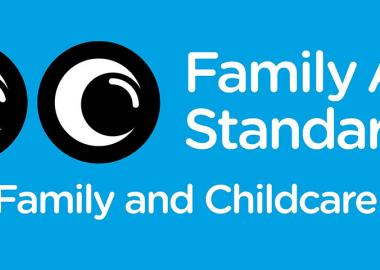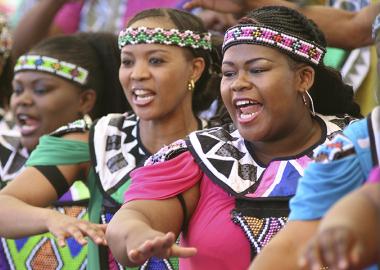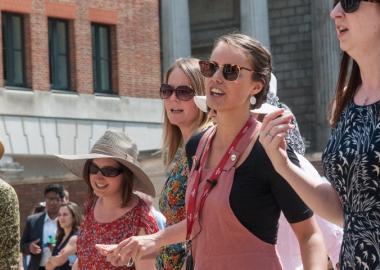Fantastic for Families is a UK-wide initiative of exciting theatre, dance, music and visual arts events designed to increase family participation in arts and culture. Run by Family Arts Campaign and supported by Arts Council England, Fantastic for Families aims to get your event information in front of as many families as possible.
You can add your event listings to the Fantastic for Families website for distribution to a number of family-facing partner channels with the combined potential reach of 9m families. Alongside this, a wide-scale national marketing and press campaign offers additional opportunities for coverage, highlights individual events, and promotes the cause for creativity for families. To find out more about this year's marketing campaign visit www.familyarts.co.uk/fantastic-for-families
Who can take part?Any organisation can take part, as long as your event:
|
Remember, it’s not just about families with younger children – a family can be any mixture of different generations, including older ones. Your event doesn’t have to be specifically aimed at families. It could be an event you’ve already programmed that you think could be appealing to a variety of age groups.
If you have an event that fits these criteria and would like to be part of the Fantastic for Families marketing campaign, you can register and upload it on the website.
1. Invite families to an event from your regular programme
You may have an event that isn’t specifically programmed for families but that could be appealing to them.
Consider the content, length and timing of your event, and communicate this to families so that they know what to expect. Check out the Family Arts Content Communication toolkit.
Then let families know that it’s relevant to them by including it in the Fantastic for Families listings and marking it with the campaign logo. Make sure they are prepared by making plenty of information about the event available prior to their visit.
Looking for ideas? Read this case study on how Royal Liverpool Philharmonic Orchestra introduced families with children to classical music.
2. Behind the scenes – family tours or open rehearsals
Many families have never ventured inside a concert hall or may be unaware of the music being made within their community, so giving them a chance to visit and experience some of the things that people don’t usually get to see can be a great way of getting families across the threshold.
You could consider setting up a meet and greet with different members of your group, giving families an insight into how a performance is actually put together and presented.
Or perhaps, with the permission of the performers, you could hold an open rehearsal, and let families see the work in progress – this can provide a fascinating insight into the creative process and encourage attendance at the performance itself. This can be most effective if there is some engagement with the families at the open rehearsal in addition to the music itself. This could include explaining what they are seeing in front of them – what is the director/conductor trying to get from this rehearsal? What is special about the performance? What is special about the group?
3. Alternative venues
If your venue can’t host a specific activity or you are a touring music group, you could look for other venues to run smaller scale activity – particularly in venues where families are likely to meet for example: libraries, community centres, parks and other community space
Taking a small group of performers to give an introductory session to the music your group makes in one of these other venues will encourage families to come and see you in the future and may even inspire some future musicians too. Why not offer special incentives to families who attend as a result of having been at one of these introductory sessions – a free programme and a free drink, or a discounted ticket.
Looking for ideas? See the huge range of venues used by Bach to Baby.
4. Pre-event family talks – setting the scene
Even if your event is not primarily aimed at a family audience, it doesn’t mean to say that families won’t come, and one way to attract more families can be to offer a pre-event talk.
This can give families insight into the event they are about to see, it can enrich the artistic experience for families and give them things to look out for during the performance – a particular instrument playing at a specific moment, a returning tune, or an understanding of what exactly the conductor is asking for.
Perhaps it might also include contextualising the event itself; something about the composer/artist and why they wrote or produced this particular piece originally, what was happening in the world at the time that might have influenced their thinking.
This could work even better as a Q&A session if the composer/artist is available to take part!
Looking for ideas? Check out the Hoo Haa festival at Colston Hall, and the work of the BBC Philharmonic.
5. Family workshops/taster sessions
Another way of encouraging families to attend your events is to offer workshops and taster sessions – for instance a come and sing day or a from scratch session when people can try out new instruments. These can be themed along with your upcoming concerts or be free-standing – whichever works best for you!
Again, consider whether you can provide attendees of these sessions with an incentive to attend events in the future.
Looking for ideas? Check out the English National Ballet, Bristol Choral Society and the Seagrave Singers.
6. Aim your event at older generations
We know that participating in the arts as a family can bring a real range of benefits, including improved wellbeing, and also strengthen family bonds. Despite this, just 10% of grandparents across the UK visit an arts or cultural event with their grandchildren.
Want to provide a welcoming and positive experience for visitors, regardless of their age? Check out the Family Arts Campaign's Age-Friendly Standards, which focus on the barriers to engagement that older family members are more likely to experience.
Looking for ideas? Read our case studies from Three Choirs Festival and St George’s Bristol.
Some things to think about …
|
We hope that you will be able to join in with the Fantastic for Families initiative.
Happy event planning!










